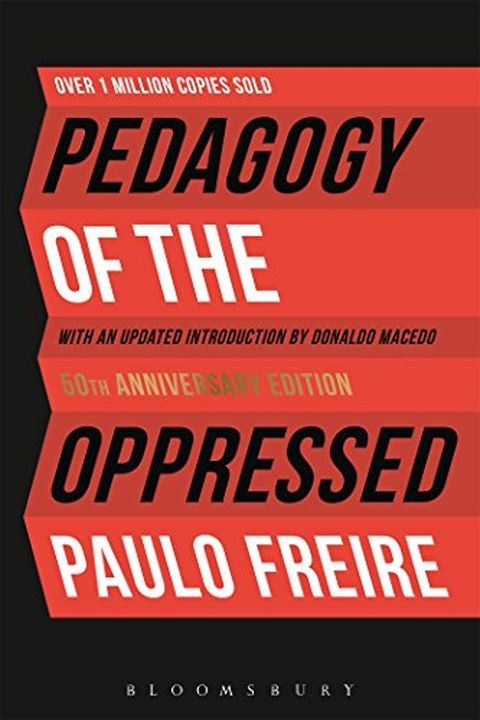Pedagogy of the Oppressed Quotes
Education either functions as an instrument which is used to facilitate integration of the younger generation into the logic of the present system and bring about conformity or it becomes the practice of freedom, the means by which men and women deal critically and creatively with reality and discover how to participate in the transformation of their world.
Leaders who do not act dialogically, but insist on imposing their decisions, do not organize the people--they manipulate them. They do not liberate, nor are they liberated: they oppress.
[T]he more radical the person is, the more fully he or she enters into reality so that, knowing it better, he or she can transform it. This individual is not afraid to confront, to listen, to see the world unveiled. This person is not afraid to meet the people or to enter into a dialogue with them. This person does not consider himself or herself the proprietor of history or of all people, or the liberator of the oppressed; but he or she does commit himself or herself, within history, to fight at their side.
Looking at the past must only be a means of understanding more clearly what and who they are so that they can more wisely build the future.
One cannot expect positive results from an educational or political action program which fails to respect the particular view of the world held by the people. Such a program constitutes cultural invasion, good intentions notwithstanding.
True generosity consists precisely in fighting to destroy the causes which nourish false charity. False charity constrains the fearful and subdued, the "rejects of life," to extend their trembling hands. True generosity lies in striving so that these hands--whether of individuals or entire peoples--need be extended less and less in supplication, so that more and more they become human hands which work and, working, transform the world.
For apart from inquiry, apart from the praxis, individuals cannot be truly human. Knowledge emerges only through invention and re-invention, through the restless, impatient, continuing, hopeful inquiry human beings pursue in the world, with the world, and with each other.
The oppressed, having internalized the image of the oppressor and adopted his guidelines, are fearful of freedom.
It is necessary that the weakness of the powerless is transformed into a force capable of announcing justice. For this to happen, a total denouncement of fatalism is necessary. We are transformative beings and not beings for accommodation.
Dehumanization, although a concrete historical fact, is not a given destiny but the result of an unjust order that engenders violence in the oppressors, which in turn dehumanizes the oppressed.
To simply think about the people, as the dominators do, without any self-giving in that thought, to fail to think with the people, is a sure way to cease being revolutionary leaders.
No pedagogy which is truly liberating can remain distant from the oppressed by treating them as unfortunates and by presenting for their emulation models from among the oppressors. The oppressed must be their own example in the struggle for their redemption (Freire, 1970, p. 54).
To glorify democracy and to silence the people is a farce; to discourse on humanism and to negate people is a lie.
This, then, is the great humanistic and historical task of the oppressed: to liberate themselves and their oppressors as well.
Freedom is acquired by conquest, not by gift. It must be pursued constantly and responsibly. Freedom is not an ideal located outside of man; nor is it an idea which becomes myth. It is rather the indispensable condition for the quest for human completion.
There's no such thing as neutral education. Education either functions as an instrument to bring about conformity or freedom.
Even revolution, which transforms a concrete situation of oppression by establishing the process of liberation, must confront this phenomenon. Many of the oppressed who directly or indirectly participate in revolution intend - conditioned by the myths of the old order - to make it their private revolution. The shadow of their former oppressor is still cast over them.
Teachers and students (leadership and people), co-intent on reality, are both Subjects, not only in the task of unveiling that reality, and thereby coming to know it critically, but in the task of re-creating that knowledge. As they attain this knowledge of reality through common reflection and action, they discover themselves as its permanent re-creators.
Libertarian action must recognize this dependence as a weak point and must attempt through reflection and action to transform it into independence. However, not even the best-intentioned leadership can bestow independence as a gift. The liberation of the oppressed is a liberation of women and men, not things. Accordingly, while no one liberates himself by his own efforts alone, neither is he liberated by others. Liberation, a human phenomenon, cannot be achieved by semihumans. Any attempt to treat people as semihumans only dehumanizes them.
P15 - Our advanced technological society is rapidly making objects of us and subtly programming us into conformity to the logic of its system to the degree that this happens, we are also becoming submerged in a new "Culture of Silence".
I can not think for others or without others,nor can others think for me. Even if the people's thinking is superstitious or naive,it is only as they rethink their assumptions in action that they can change. Producing and acting upon their own ideas—not consuming those of others.
The pursuit of full humanity, however, cannot be carried out in isolation or individualism, but only in fellowship and solidarity;.
The man or woman who proclaims devotion to the cause of liberation yet is unable to enter into communion with the people, whom he or she continues to regard as totally ignorant, is grievously self-deceived. The convert who approaches the people but feels alarm at each step they take, each doubt they express, and each suggestion they offer, and attempts to impose his "status," remains nostalgic towards his origins.
